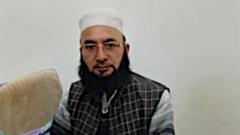Farooq Ahmed's world shifted irreparably when he lost his brother, Mohammad Iqbal, to cross-border shelling in Kashmir. Iqbal, a teacher at a local madrassa, became a casualty of a broader military conflict that has plagued the region for decades. However, the family's anguish intensified as media outlets falsely labeled Iqbal a terrorist, igniting a painful disinformation campaign that compounded their grief.
**Media Misrepresentation Deepens Grief: Kashmiri Family's Pain Exposed**

**Media Misrepresentation Deepens Grief: Kashmiri Family's Pain Exposed**
The distressing impact of sensationalist media coverage on a grieving family in Kashmir raises critical questions about responsibility in reporting.
Ahmed vividly recalls the moment he learned of the media's allegations: “It was like having salt rubbed into our wounds. The dead can't defend themselves.” In the wake of Iqbal's death, which occurred amidst escalating tensions following a militant attack, misleading narratives spread swiftly on social media and mainstream news. Prominent channels erroneously referred to Iqbal as a terrorist from the group Lashkar-e-Taiba, driving family members into public scrutiny.
Despite police clarifications categorically stating Iqbal's innocence, the damage had been done. As Ahmed reflected, “By then, the false claim would’ve already reached millions of people in India.” Though he contemplates legal action against the media, financial struggles from losing the family’s sole breadwinner hamper these efforts. With Iqbal's survival returning to the forefront of community discourse, the debate surrounding media ethics in conflict zones has never been more crucial. The harrowing incident serves as a reminder of the human cost associated with reckless journalism in a fractured geopolitical landscape.
Despite police clarifications categorically stating Iqbal's innocence, the damage had been done. As Ahmed reflected, “By then, the false claim would’ve already reached millions of people in India.” Though he contemplates legal action against the media, financial struggles from losing the family’s sole breadwinner hamper these efforts. With Iqbal's survival returning to the forefront of community discourse, the debate surrounding media ethics in conflict zones has never been more crucial. The harrowing incident serves as a reminder of the human cost associated with reckless journalism in a fractured geopolitical landscape.


















